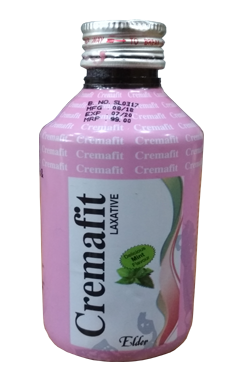Suspension Presentation
Each 15ml contains:Liquid Paraffin IP 3.75ml
Milk of Magnesia IP 11.25ml
This medication is used for a short time to treat occasional constipation. Milk Of Magnesia is a laxative (osmotic-type) that is thought to work by drawing water into the intestines, an effect that helps to cause movement of the intestines. Liquid paraffin is primarily used as a pediatric laxative in medicine and is a popular treatment for constipation.
Uses
- Constipation
- Heartburn
- Upset stomach
- Haemorrhoids
- Indigestion
Mechanism of action
Milk Of Magnesia works by increasing the osmotic effect in the intestinal tract and drawing water in. This creates distension of the colon which results in an increase in peristaltic movement and bowel evacuation. Osmotic effect of magnesium hydroxide helps to draw water into the gut from surrounding tissues. With this increase of water in the intestines, the feces will soften and the intraluminal volume of the feces will increase. These effects still stimulate intestinal motility and induce the urge to defecate. Magnesium hydroxide will also release cholecystokinin (CKK) in the intestines which will accumulate water and electrolytes in the lumen and furthermore increase intestinal motility. Liquid paraffin is primarily used as a pediatric laxative in medicine and is a popular treatment for constipation and encopresis. It acts primarily as a stool lubricant, and is thus not associated with abdominal cramps, diarrhea, flatulence, disturbances in electrolytes, or tolerance over long periods of usage, side effects that osmotic and stimulant laxatives often engender. The drug acts by softening the feces and coats the intestine with an oily film. Hence, reduces the pain caused by certain conditions such as piles.Side Effects
The product is possible safe for most adults. There is no disadvantage associated with the product if taken under the recommended usage however severe nausea, vomiting, or diarrhoea can occur in some patients.Interaction
Magnesium Hydroxide can react with the following medications:- Aspirin
- Bisacodyl
- Ciprofloxacin
- Furosemide
- Gabapentin
- Ibuprofen
- Levothyroxine
- Ranitidine
- Tramadol
- Vitamin D3
Contraindication
- Renal dysfunction
- Intestinal obstruction disorders
- Inflammatory bowel disease
- Pregnancy and Breast Feeding
Know About new DCGI Approved Products
Copyright © by Alaina Pharma. All rights reserved.
Created by Alaina Pharma
